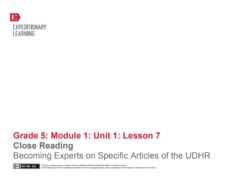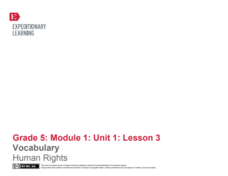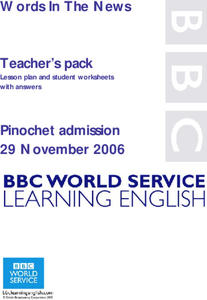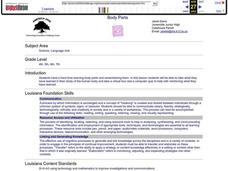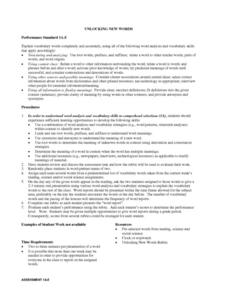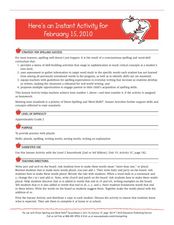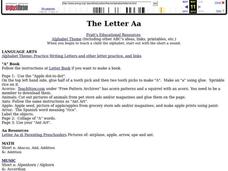EngageNY
Close Reading: Becoming Experts on Specific Articles of the UDHR
A continuation of the previous lesson, which is part of a larger group of lessons on human rights (see additional materials). Here, in Lesson 7, your class will explore more articles from the Universal Declaration of Human Rights. After...
EngageNY
Vocabulary: Human Rights
Your class continues to explore the history of the Universal Declaration of Human Rights. In addition to learning about the background of this text, learners work on the skill of identifying and understanding key academic vocabulary....
National Constitution Center
AP English Language—Precision of Language
Say what you mean and mean what you say. The Precision of Language addresses the importance of words, especially when they concern a person's rights. Scholars take a look at many different examples and complete questions analyzing the...
Curated OER
Words In The News
A complete resource from BBC World Service provides informational text for English or ESL classes to teach vocabulary, grammar, and reading skills. Learners participate in small group work, whole class discussions, and role-plays to...
Curated OER
Body Parts
Students discuss the importance of systems of the human body and ways each has its own function while relying on the others. Students work in groups to research their assigned system. They complete a report. Students take virtual tours...
Curated OER
O Captain! My Captain - Part 3
Heroic Trading Cards? Using a suggested list, class members use the Internet to find information about a memorable leader, select and transfer images, and craft a trading card celebrating their leader’s qualities and accomplishments. A...
Curated OER
Fact vs. Opinion (Part II)
How can you tell the difference between fact and opinion? Using newspapers, learners determine which articles contain statements of fact, and which articles reflect the writer's opinion. The lesson plan includes a discussion format and a...
Curated OER
Alexander Hamilton and the Roots of Federalism
Explore the origin of political parties in the United States. Learners work in groups to read and analyze copies of the "Report on Manufactures" written by Alexander Hamilton. Then, they complete a worksheet comparing the Federalists to...
Illustrative Mathematics
Margie Buys Apples
One of the most common, everyday applications of math is dealing with money. This single problem calculating how much change Margie receives is more involved than it appears at first glance. An understanding of how fractions and decimals...
EngageNY
Close Reading: Focusing on Taking a Stand (Chapter 2 cont.)
Scholars complete a close read of To Kill a Mockingbird and determine why characters take a stand. They use text-dependent questions and Note-catchers to help guide their thinking. Readers review the Taking a Stand Anchor chart and...
EngageNY
Operations with Numbers in Scientific Notation
Demonstrate the use of scientific notation within word problems. The lesson presents problems with large numbers best represented with scientific notation. Pupils use these numbers to solve the problems in the 11th installment in a...
Purdue University
Light – Just Right!
What does it mean to be resistant to electricity? Scholars answer the question in a six-part STEM lesson on electricity. They begin by assessing the conductivity of several different materials and progress to designing their own circuits...
Curated OER
Unlocking New Words
Students are introduced to the various types of suffixes and prefixes. In groups, they identify the root words and determine the proper suffix or prefix to add to the root. They complete a worksheet and review their answers to end the...
Curated OER
Greek, Latin and Anglo-Saxon Roots to Better Vocabulary
Seventh graders review the concepts of affixes and roots. They practice common Greek, Latin, and Anglo-Saxon ones which are used to form many words in English. Students develop an awareness of the formation and evolution of words.
Curated OER
Turning the Tables: A Guide to Devising Your Own Story
Students observe and demonstrate how to decipher and organize the information in a math word problem and apply mathematical concepts to different story problems. They discuss the parts of a story problem, and write their own original...
Curated OER
Here's an Instant Activity for February 15, 2010
Second graders complete a spelling activity to learn how to spell plural words. In this plural words lesson, 2nd graders complete an oral spelling activity with their teacher and then a worksheet to spell plural words.
Curated OER
Language Arts: Who Am I?
Twelfth graders write self-identity essays of three to five paragraphs in length. They include topic sentences, transition words, and concluding paragraphs in their essays, They read their essays to classmates.
Curated OER
Intro To Probability
Students investigate the concepts related to the practice of using probability. They review the use of mean, median, and mode within the context of previous instruction. Students predict outcomes and calculate them in small groups. The...
Curated OER
Always Allow Alliteration (part 1)
Students identify letters and sound that are being alliterated in a text they are given. In this alliteration worksheet, students also create alliteration in words and sentences.
Curated OER
The Letter Aa
Students explore letter Aa. In this letter recognition lesson, students participate in country, state, food, literature, physical education, colors, careers, music, and game activities that are linked to the main lesson page....
Curated OER
Verbs; Simple Past (Regular Verbs)-2
In this foreign language worksheet, learners complete sentences by filling in the blanks. Each sentence contains a hint that gives the student a clue as to the intended final meaning of the sentence.
Curated OER
Introduce: The Suffix -ed
Students examine language. In this word-making instructional activity, students discover the meaning of the suffix -ed. They work in small groups to create a list of words using this suffix. This instructional activity includes...
Curated OER
Introduce: The Prefixes un- and dis-
Students study language. In this word-making lesson, students discover the meanings of the prefixes un- and dis-. They work in small groups to create a list of words using these prefixes. This lesson includes modifications for ELL...
National History Day
Propaganda Posters of World War I: Analyzing the Methods Behind the Images
The power of a picture. During the events surrounding World War I, propaganda posters were widely distributed in American society to sway the emotions of its citizens. By analyzing World War I propaganda posters in the first installment...


